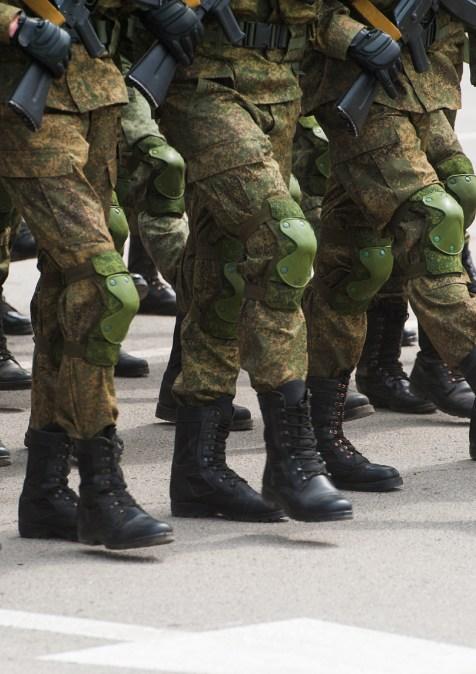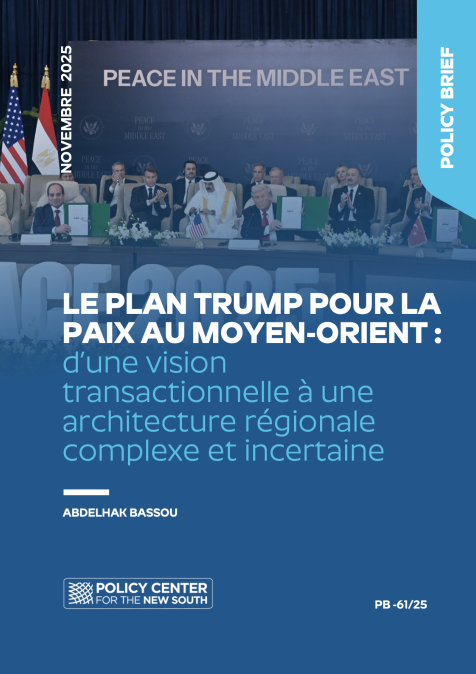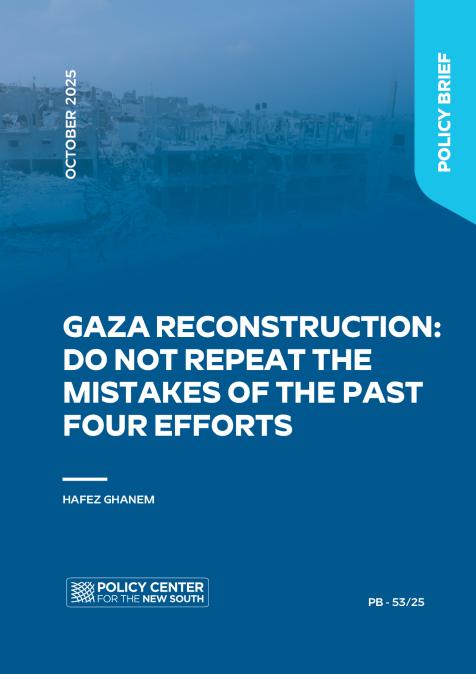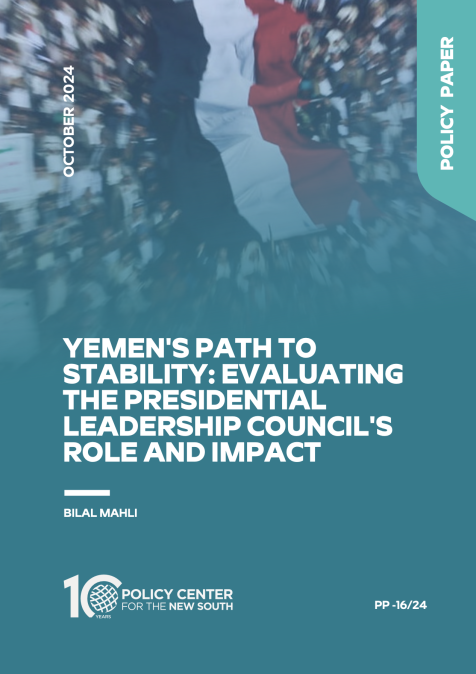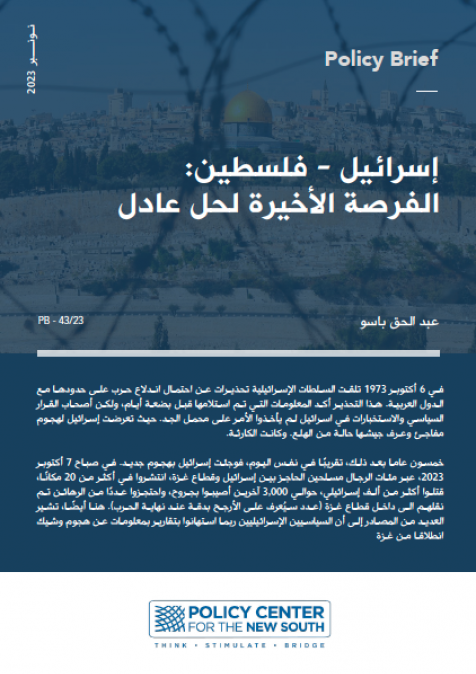Publications /
Opinion
The 132nd day in the Gregorian calendar, anno 2018, will be part of history, a day future generations will most likely not forget, the 12th of May. Only history buffs will remember that on the 12th day of May, Napoleon conquered Venice, once known as the “Most Serene Republic”. On May 12th and the following days in the year of 1940, the Nazis crossed the Meuse and defeated France in a Blitzkrieg. England’s King George VI celebrated his coronation in 1937, on this same fateful day, which will follow us through history and into eternity, hopefully. By May 12th of this year Donald Trump, the President of the United States, will decide whether he will allow pragmatism and peace to prevail, or allow his instincts, emotions and a simplistic spirit of nationalism lead the world towards tension, terror and, possible destruction— into a war, possibly two. May 12th of 2018 will be the day for a fundamental political decision, which will affect America’s standing in the world, and will diminish respect for the man in the White House, whatever esteem remains. The decision of the President will affect the globe, the future.
Almost certainly, Donald Trump will tear up a 159-page agreement, signed three years ago by Iran with the US, Russia, China, the EU, Germany and France, entitled the “Joint Comprehensive Plan of Action,” ensuring at least for a decade that Tehran would not develop nuclear weapons. In January of this year, the US President claimed that the Iranian regime was “the world’s leading state sponsor of terrorism,” which funded, armed and trained 100,000 militants to spread destruction across the Middle East. Therefore, he does not trust the agreement and projects to withdraw from “this disastrously flawed deal”, which he also referred to as the “worst ever”. He is giving his European allies “one last chance,” until May 12th, to pressure Iran into changes and improvement of the agreement, or the United States would not be part of it anymore. The Europeans, who worked 13 years to find a compromise with Tehran and Washington, were not amused and certainly opposed to a new deal. As stated by Britain’s Foreign Secretary Brian Johnson, “I do not think anybody so far produced a better alternative”. Yes, the European governments could possibly agree to secure a supplemental agreement that would impose new multilateral sanctions, if Iran continues to develop or test long range missiles, a proposal Trump could possibly accept, although his demand for fundamental changes would likely be rejected by not only Iran, but the other parties involved as well. First, any bill Trump would be willing to sign with the US Congress must demand that Iran allows immediate inspections at all sites requested by international inspectors. Second, it must ensure that Iran never even comes close to possessing nuclear weapons. Third, unlike the current nuclear deal, the provisions put forth by Trump must have no expiration date. In sum, the policy of Trump would be to deny Iran all paths to nuclear weapons not just for ten years, but forever. Fourth, the legislation must explicitly state in US law (for the first time) that long range missiles and nuclear weapons programs are inseparable, and that Iran’s development and testing of missiles should be subject to severe sanctions. If at any time the US President would judge “that such an agreement is not within reach”, he will then “withdraw from the deal immediately”.
Time is up, and dramatic changes are not in sight. Next month, history will be written. A war with Iran is anticipated, a nuclear conflict with North Korea not impossible. Why? Mr. Kim Jong Un may not accept what Donald Trump will offer or demand at their meeting, probably towards the end of next month and the Ayatollahs in Tehran may decide to restart their own countdown for their nuclear bomb immediately. How will Washington react? Trump’s National Security Advisor, John Bolton, considers any negotiations with Pyongyang “worse than a mere waste of time”. In January, a few months before his appointment, the former US ambassador at the UN, published, in the Wall Street Journal, his “legal case for striking North Korea first”. Iran? Airstrikes are in fashion these days, as documented by a timid, theatrical missile attack on chemical research and production sites in Damascus. The inconvenient truth is that only military action can accomplish what is needed” - the destruction of the nuclear sites of Iran, which would delay, Bolton’s calculation, the bomb project for up to five years. In other words, the world is facing more uncertainty, at least since Trump is confronted to difficult congressional elections this fall. His majority is in danger, in the Senate as well as in the house of representatives. A war or not a war, that is the Shakespearian question. Wars and drama allow patriots to gather around the flag, sing the national anthem, and repeat “America First,” in unison and always.
James Stavridis, former Supreme Allied Commander of NATO, and four-star admiral, did not hesitate to publicly declare, “this is a President who revels in chaos”. Trump, inconsistent in his decisions and opinions, has said, Stavridis recalls, “he doesn’t want our enemies to know what we are thinking; the problem is, neither do our friends nor even, it seems at times, do we ourselves”. The admiral is certain though that since Trump appointed John Bolton “the drums of war are beating louder, and in the Pentagon they are taking a deep breath and preparing for conflict not only on the banks of the Potomac, but also, more dangerously, around the world”. The first possible and certainly dramatic consequence that would derive from the end of the nuclear deal would be a nuclear arms race in the Middle East, close to the shores of Europe. Tehran, Riyadh, and why not, Ankara, would join the already nuclear covered Israelis. Not real sober nations, anchored in democratic foundations. The rendezvous between Mr. Trump and Mr. Kim, both bombastic and drama-inclined leaders, may end without a happy end but with disenchantment instead or perhaps, fear. What remains as an alternative to diplomacy is the art of compromise? Will Tehran return to the table of negotiations? Will Pyongyang ever trust any US President again? Never before did the dictator, formally, negotiate any political deals with foreigners. Zero experience. His trip to Beijing, the end of last March, travelling in an armored train, was the dictator’s first voyage outside his country since he took power in 2011. Kim Jong Un may be a cruel, shifty, ruthless antagonist, but at the end he is a novice in international politics, and Trump will certainly try, just by his body mass of 1.85m and 115 kilos, to intimidate his chubby opponent, who stands at 1.7m, and weighs 136 kilos. Mr. Kim had time to analyze how Trump just destroyed a deal which took 13 years to agree upon, an agreement Iran signed in good faith and never breached, not even once, as inspectors of the International Atomic Energy Agency (IAEA) confirmed after 10 different controls. Why should Trump be trusted, after he treated the leader of North Korea as a “madman” and threatened his nation with” total destruction?” Why wouldn’t Tehran refuse to enter into new negotiations with Donald Trump after having been accused of being a terrorism exporting state?
The Iran nuclear deal marked the first time the United States and Iran had agreed to a significant exchange of concessions that not only eliminated Iran’s pathway to a nuclear bomb and lifted sanctions, but also put an end to almost four decades of American efforts to completely isolate Iran. It signaled that America, 36 years after the Iranian revolution, was coming to terms with Iran. Both sides, writes Trita Parsi, author of the article “Losing an enemy: Obama, Iran and the triumph of diplomacy,” published in the bimonthly new magazine Foreign Policy, agreed to painful concessions, both faced fierce domestic political opposition, and both recognized that the agreement signaled a major break with past policies. America was coming to terms with Iran and the Islamic Republic was speaking of the US not as the Great Satan, but as a negotiation partner.” The author, President of the “Iranian American council,” deplores that despite Iran’s concessions and adherence to the deal, Trump, Saudi Arabia and Israel “have clearly rejected Iran’s regional integration under any circumstances. Changes in Iran policies proved insufficient, so nothing short of Iran’s complete capitulation can seemingly satisfy Trumps allies” - and Trump himself. The Washington foreign policy crowd, in which Trump fans are rare, is aghast. Richard Haas, President of the Council on Foreign Relations, is predicting that “America is heading for war with North Korea, Iran or both. This is the most perilous moment in modern American history”. The President, as his enthusiasm for sabre rattling suggests, has no ideology and few well-informed beliefs, the Economist judged, “he has instinct and a day to day appreciation of interests, chiefly his own.” Yet, it is still hard to imagine Mr. Trump starting a war, unless he thought he would gain from it personally- he would certainly not gain from a bloodbath. War or peace, who knows?
The collapse of the nuclear deal will reverberate across the landscape of Americas interests and influence, generating a trans-Atlantic rift, Suzanne Maloney of the Brookings Institute predicts, at least as acrimonious as that incited by the 2003 Iraq war, undermining multilateral diplomacy around other urgent crises (such as North Korea) and bolstering Russian and Chinese influence in the Middle East. The Brookings expert states “Many project that the end of the nuclear deal would launch an inexorable march toward a direct military conflict with Iran, with ruinous consequences for regional stability and the global economy.” Bearing a war with North Korea (and the vortex of policy attention and military resources that the conflict would create) seems likely, suggests Barry Posen, Professor for Political Science and Director of the Security Studies program of MIT, who states that “more confrontation with Iran is in the United States’ future.” For Pentagon boss James Mattis, the 80 million Nation Iran, mainly Shiite, is “the single most enduring threat to stability and peace of the Middle East.” Since the collapse of governments and nations during and after the Arab spring, the presence of Iran and its elite troops, their proxies as the Lebanon based Hezbollah, seems suddenly more visible and menacing, especially for Sunni-Nations like Saudi Arabia. Vali Nasr makes the point, in Foreign Affairs, that “a return to containment of Iran will be difficult. Two important building blocks are missing: Iraq and Syria are weak and broken, unable to control their own territories and ruled by governments that are closer to Iran than to the United States Arab allies. Vali Nasr, Dean of the Paul H.Nitze School of Advanced International Studies at Johns Hopkins University, confirms that many aspects of Iran’s behavior pose serious challenges to the United States. Washington lacks both the capacity to roll back Iranian gains and the ability to fill the vacuum that would result from it. For the author, Iran’s foreign policy is far more pragmatic than imagined in the west: “As Iran’s willingness to engage with the United States over its nuclear program showed, it is driven by hardheaded calculations of national interest, not a desire to spread its Islamic Revolution abroad.” In 2016, according to the Stockholm International Peace Research Institute, Iran was not the assumed big spender on defense. In fact, Tehran spent three percent of its GDP on the military, less than the proportions spent by Saudi Arabia (ten percent) or Israel (six percent), Iraq (five percent), putting Iran in eighth place in the Middle East in terms of defense spending as a percentage of GDP. In 2016, Saudi Arabia spent 63.7 billion USD on defense, while Iran only spent 12.7 billion USD. There is no doubt, without Iran’s help, the engagement of their own troops and their proxy, Hezbollah, Bashar al Assad would not have survived. Russian officials praised the effectiveness of Hezbollah units but Moscow does not appreciate that Iran is using Syrian territory as a permanent transit point for weaponry delivered to Hezbollah, since Russia seeks to preserve its privileged relations with Israel. The Iran backed and financed, self proclaimed Party of God, is more than just an irritant, armed with more than 10,000 rockets to intimidate Israel, but an increasingly powerful status quo force, using its religious and military power to enhance its national and regional influence. Israel is today, without question, faced with an emboldened Hezbollah on its Lebanon border and a more permanent presence in Syria, where Tehran also would like to have access to its own naval base at the Mediterranean. The relations between Moscow and Tehran, which deepened in the common fight for Assad’s survival, are good enough for the two nations to discuss a defense agreement that would provide Russia with access to Iranian air bases. In Iraq, populated also with militant Shiites, Iran is working through an array of Kurdish and Shiite forces. Iran shapes alliances, forges governments, settles disputes and decides policies. As a result, observed Vali Nasr “Iraq is influenced more deeply by Iran than any other country, including the United States.” Shiite volunteers, paid and trained by Tehran, fighting for Assad and against Islamic State, will remain loyal militants for Iran in foreign Arab lands in years to come. Since the Saudis transformed the civil war in Yemen into a regional conflict by launching airstrikes on March 2015, trying to halt the military progress of a rebellious tribe (which occupies the capital city Sana’a) ever since), Iran seems to be involved as well— even smuggling ballistic missiles into the war zone-seven were fired upon Saudi targets (three directed at Riyadh) on the third anniversary of the war, which turned into “the worst man made humanitarian crisis of our time”(United Nations). True, the Revolutionary Guard Corps, and its elite Quds forces, are arming and training the Houthi rebels, members of a small Shiite group, Ansar Allah, but Saudi Arabia is blocking Yemen’s harbors, through which medical supplies can’t reach the suffering population anymore, and is attacking relentlessly from the air, turning a once picturesque, poor nation into rubble and dust. Trump, showed little interest in the ferocious war in Yemen, which is turning day after day into a biblical tragedy. Instead the Saudis, with their minister of defense, Mohammed bin Salman, the probable future king, are encouraged by Washington in regards to their brutal war strategy. When the crown prince came by to the White House the other day, he purchased, in addition to an already agreed 110 billion arms deal, some more military hardware, just one billion dollars, and the President showed his appreciation in public as he stated ”Saudi Arabia is a very wealthy nation. And they are going to give the US some of that wealth, hopefully in the form of jobs, in the form of purchase of the finest military equipment anywhere in the world.” That same day, the Republican controlled Senate blocked a resolution to limit US involvement in the war of Yemen. A possible consequence of this decision is that the troops Trump had decided to withdraw from Iraq and Syria,(against the will of his leading generals due to the presence of a few thousand Islamic State terrorists and Hezbollah militants in Syria and Iraq), may end up fighting on the ground in Yemen, or advising Saudi troops. Possibly GIs may confront soldiers of Iran’s Revolutionary Corps? A dream come true for Riyadh, the United States taking on the Iranian enemy for them— perhaps in exchange for some more billions in weapon deals. “The Nazis and the Iranian regime are ideological very similar,” believes Thamer al Sabbah, the Saudi minister for Gulf Affairs, accusing the Iranian enemy of assembling a “new Islamic army that relies on chaos and aggression.” The Saudi government official is convinced, Tehran does not want to weaken Saudi Arabia, “they want to take over the region altogether. Their only speed bump is the Kingdom.” The war in Yemen, part of the speed bump, has turned into a human and strategic catastrophe, a miscalculation and a model of modern mismanagement. More than three years ago, when the Saudis informed Washington that they were ready to crush the rebels, who had driven the President from power and occupied San’a, Obama’s Deputy Secretary of State, Tony Blinken, hurried to consult the Prince/warrior, just 28 years old at the time, and ready to rumble, in the Saudi capital. The objective of the Royal minister of defense was clear: “Eradicate all Iranian influence in Yemen.” The American diplomat was shocked. He realized to purge all sympathizers of Iran would end in a bloodbath. “I told him you could do many things to minimize or reduce Iranian influence. But eliminate it?” The future king, fan of the video game “Call of duty,” intensified the war. In May 2017, he had suggested another military intervention, “the influence over the Middle East ought to take place inside Iran,” the Crown Prince argued. Indeed, in June of last year ISIS gunmen and suicide bombers attacked the Iranian parliament building and the mausoleum of Iran’s first supreme leader, Ruholla Khomeini, killing 18 people. For the Sunnis of Riyadh, the Shiites of Tehran are an obsession, and whoever shows understanding or sympathy for the Shiites in Iran, is in danger to be excluded, punished, eliminated. Suspicion along with fear drive their arguments and radical reactions, as was visible when Saudi Arabia and the United Emirates declared Qatar and its Emir an enemy of the Arab people, yes, he was treated as a traitor. Saudi Arabia closed its border and the air space for Qatar, even an invasion was discussed. The proof of treason has been seen by all loyal citizens on Qatar TV— one day a series of unusual quotations began to crawl across the bottom of TV sets such as “Iran is an Islamic power in the region that cannot be ignored” and “Hamas is the legitimate representative of the Palestinian people.” These statements were attributed to Tamim bin Hamad al Thami, the Emir. He reacted with fury to the accusations and claimed (proven to be correct later) that enemies of his state, hackers, had invented these messages to hurt his reputation and the honor of his nation. His crime, besides accusations of financing terrorist organizations, was having friendly relations with the enemy of Saudi Arabia. Iran is the red line, the Nazi’s of the Muslim world. Even Trump, the Saudi’s Godfather of the Iran conspiracy, was not only trashed by Saudi newspapers and put under pressure by the Crown Prince personally, when the President decided to declare Jerusalem the capital of Israel. Indeed, Trump was publicly accused by the former Saudi ambassador in Washington and Saudi intelligence chief, Prince Turki al-Faisal, to have advanced the cause of their enemy, Iran. In a personal letter to the White House, published in Al Jazeera, the influential Saudi stated, “(…)Your decision also emboldened Iran and its terrorist minions to claim that they are the legitimate defenders of Palestinian rights against Israel’s and America’s imperialist aims.” Qatar, just a footnote, is still under siege, blockaded by their neighbors, and the United States, which have stationed 11,000 soldiers in Qatar, recently sold F-15 fighter jets, worth 12 billion dollars, to the enemies of their ally Saudi Arabia—go figure! To confuse the issues even more, we should not forget, that the future King of Saudi Arabia recently announced, that women are allowed to drive, watch football matches, and Israel has the right to have a homeland in the Middle East, as neighbors of the Palestinians. Israeli fighter jets, (surprise, surprise), are giving Egypt a hand, by bombarding bases of radicals of ISIS in the Sinai desert. Pretty soon Israel’s fighter pilots will have Hezbollah militants in their sight, somewhere in Syria… And Iran will retaliate. Let’s just survive May 12th, and then we will know how history will remember the 12th May anno 2018, the 132nd day in the Gregorian calendar.
A possible consequence of this decision is that the troops Trump initially had decided to withdraw from Iraq and Syria may actually end up fighting on the ground in Yemen, or advising Saudi troops despite international condemnation. In the meantime, Israel’s fighter planes attacked a Hezbollah base in the Syrian desert and at least seven Iranians were killed.


